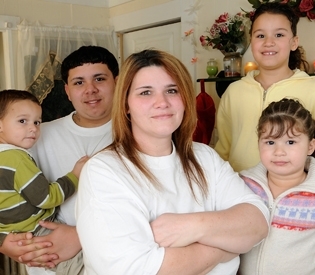Can you handle another story that features a bad example? We had a feeling you might.
There are thousands of women like this, which is a problem unto itself, but introducing her leads to a larger point.
The well-fed 35-year old woman in the middle of the picture is Tessa Savicki (anagrams include “Avast, Sickies” and “Cake Ass Vista”), a Massachusetts welfare queen. Her oldest kid is, ahem, 21. She has another adult kid. She’s “planning on getting her GED next month”, not unlike the stripper who’s working on her Ph.D. or the fat girl who’s definitely going to start going to the gym. A chronic plaintiff, Miss Savicki (That’s “Miss”, guys! She’s available!) once sued a major drugstore chain for selling her an expired spermicide. (She might have a case. That spermicide looks like it went bad sometime around Reconstruction.) The remainder of what you need to know about Miss Savicki is captured in the caption, with one exception.
When this human gumball dispenser jettisoned her most recent kid, the attending physicians, God bless them, finally tied her tubes before she could create a designated hitter for the Savicki family softball team. She’s suing the hospital, and her attorney says the hatred his client is spawning engendering “blows your mind, because you see how ingrained the bigotry is against poor people.”
Wait right there, attorney Max Borten [(781) 890-9095, inquiry@GBMedLaw.com]. But thank you for leading to this week’s topic: the difference between poor and deadbeat.
The Control Your Cash authors have been poor. They’ve been rich. (Sophie Tucker: “Rich is better.”) But every step of the way, they’ve been unaware of any bigotry against poor people in the United States, at least unaware of any practiced by adults. The kid who wears tattered clothes to school might get laughed at by his peers, but the adult who openly pokes fun at someone for not having sufficient material luxuries in his life is either rare or nonexistent.
There’s no shame, none whatsoever, in being poor. Most of us have been there, making very little money and living in the rustic apartment immediately out of college or high school, furnishings courtesy of the Home Depot particleboard collection. Poverty, or at least extreme modesty, is usually a necessary step before you can earn your place among the middle class.
Being deadbeat is something else. Denuded of its buzzwords (“great society”, “hand, not a handout”, “living with dignity”, “economic security”), it’s theft. Taking money from industrious taxpayers, even if it’s for food, clothing and shelter, is stealing if the recipient offers nothing in return. Receiving the money through the conduit of a government agency doesn’t make the recipient any less culpable.
- Artie Lange completing a triathlon.
- A Libertarian candidate becoming President.
- Nauru taking home Olympic gold in speed skating.
These are things that will occur millennia before a welfare queen (or king, or princess) Controls His or Her Cash.
Few of us start life with the advantages of a Jennifer Gates or a George W. Bush, but that’s not the point. If you’re born healthy enough to have your faculties, your senses, to be able to speak (and sue drugstore chains), and to make it to the age of 35 and counting, then you can theoretically someday make your way to comfort if not affluence. Here’s how not to do so, with a virtually guaranteed rate of success:
- Jump from relationship to relationship
- Spread your legs, repeat ad nauseam (or for you guys reading, plant that seed in any warm place it’ll land)
- Drop out of school, again more than tangentially related to the previous two points
If you do the above, you’ll have less chance to get a job. You’ll all but eliminate your chance at getting a job with vertical room to progress. But thanks to the largesse of an increasingly squeezed public, you’ll get enough money to live and keep cranking out babies. Unless a surgeon with some foresight decides to throw the rest of us a bone.
We preach discipline at Control Your Cash, which should be neither hard nor painful for you. Spend less, save more, keep your mind open, learn how investments work before committing to them. Know what an investment is, and don’t confuse it with an expense. In short, show up here every week and get yourself informed.
But you’ve got to at least want to. It’s clear that lots of people can’t be bothered to.
Last month we awarded the golden Control Your Cash Man of the Year chalice to a guy with no debt, growing investments, and a reasonably well-spending lifestyle who would sooner rob a bank than suck at the taxpayer teat. In Control Your Cash Bizarro World, we’d have a prize for Tessa Savicki. Maybe a platinum-coated IUD.
**This post is featured as one of the best Personal Finance Rants of 2010**




